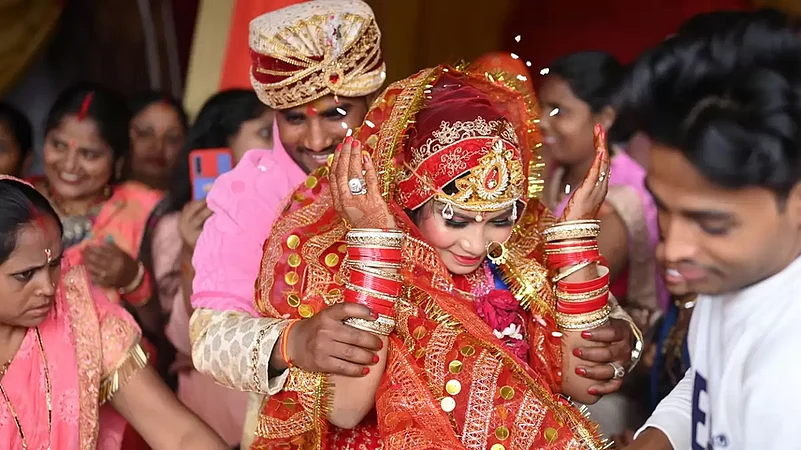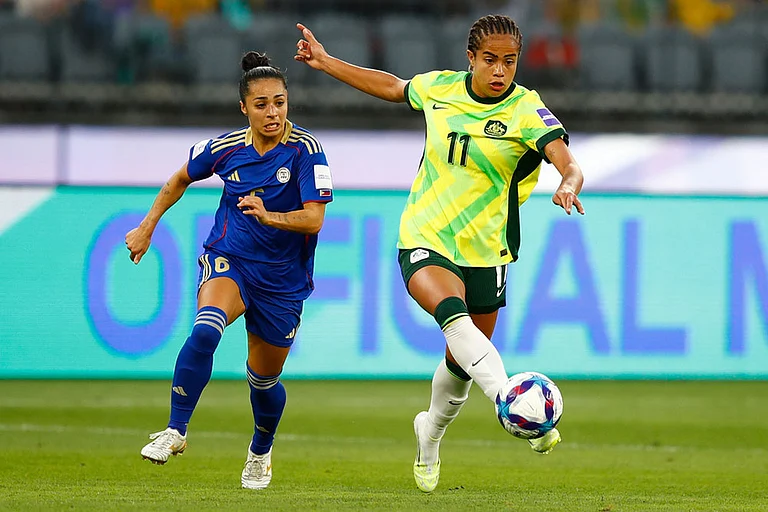Marriage is not only a question of dignity, it is also a bouquet of rights that LGBTQ people are being denied…”
Senior Supreme Court advocate Menaka Guruswamy
In Indian society, marriage has been considered a sacramental union and forms the basis of the family structure. Although variously defined, in its archaic form, marriage looks as the social union between a male and a female (by birth) forming a social institution for the establishment and regulation of a proper relationship between the sexes. However, with changing social times there have come conflicts around whether marriage is a sacramental union sanctioned by divinity (religion), or a social contract.
Arguing for the petitioners seeking legal recognition for same-sex marriages, senior counsel Mukul Rohatgi on Tuesday said, "Concept of marriage has changed over the last 100 years. Earlier, we had child marriages and temporary marriages, a person could marry any number of times; that also changed”.
In light of such developments, here’s a brief look at the evolution of marriage as an institution in India.
Every country has its own sets of customs, cultural and religious beliefs and traditions around the marriage of men and women. While these customs may vary from society to society, disregarding the same can become contentious in India where marriage is deeply a religious affair for most communities.
Hindu scriptures like the Shastras mention that the relationship between a husband and wife is established through “wedding” or “marriage: with day-long customs and rituals. It is believed to be irrevocable because, in Hindu marriage, customs are sacrosanct. This means that “divorce” is not considered part of Indian culture and even today, the idea is frowned upon.
Wedding traditions nevertheless vary greatly from region to region and across communities.
Over the years, sociologists have offered several definitions to the concept of marriage and one of the most popular ones among them read, ‘Marriage is a contractual agreement which formalizes and stabilizes the social relationship which comprises the family.’ The anthropological handbook “Notes and Queries (1951)” defined marriage as “a union between a man and a woman such that children born to the woman are the recognized legitimate offspring of both partners.”
In India, as elsewhere, marriage also includes a very distinct economic aspect. In Arsha Vivah, for instance, the bride is given to the groom by her father for exchange for cattle. In other cases, she is married with expensive jewellery and clothes - items which Manusmiriti referred to as the woman’s stridhan. Even today, “dowry” money continues to be a sizable expenditure from families of brides.
Gay Marriage in India
Those opposing gay marriage often claim that such a union would be against Indian cultural ethos. However, the Vedas do not restrict homosexuality and there are numerous Hindu deities that are shown to be gender-fluid and fall into the LGBT spectrum. Lord Ayyappa, for instance, is said to be born of Hari-Hara (Vishnu-Shiva). Shiva, one of the most important Gods in the Hindu pantheon, is himself referred to as “Ardh Narishwar”
Following the decriminalisation of homosexuality in India, the movement for LGBTQ rights has expanded from demanding decriminalisation and protection from discrimination to broader social equalities like the ability to marry, raise a child and family, and ability to participate in social, cultural and community spaces.
In this context, the ongoing battle to seek legal recognition for same-sex marriages in India has become a disputable argument because it “affects the interests of every citizen in an exclusively heterogenous institution”. This argument was posed by the Centre in its recent plea as a counter-argument to seeking legal recognition of same-sex marriage.
“The question concerning legal recognition of same-sex marriage and its parity with the existing concept of marriage, as an exclusively heterogenous institution, which is governed by the existing legal regime and has a sanctity attached to it in every religion in the country, seriously affects the interests of every citizen. It raises critical issues as to whether questions of such a nature, which necessarily entails the creation of new social institution, can be prayed for as a part of the process of judicial adjudication,” said the plea.
Further, for continuing the family chain or society procreation is needed. Procreation is possible through the gratification of sexual desires. For Hindus, the birth of a child is considered to be essential and hence marriage becomes obligatory in a traditional, heteronormative Hindu society.
Researchers note notion of a traditional family did not work for queer people, they went to lengths to establish alternate family structures which are less violent and less toxic.
“A traditional family is heteronormative and monogamous that reinforces social divisions that can easily push different genders and sexualities to the margins to term them as “unacceptable”. Legalization of same-sex marriage may cause non-conforming people from the LGBTQIA+ community to conform to societally accepted familial systems which would give out the message that traditional families are the only acceptable structures,” Ayanabha Banerjee, a student of media studies, had written for Outlook in the past.
Why Govt Opposes Gay Marriage
Successive Indian governments have repeatedly challenged any calls to recognise same-sex marriages, saying that allowing so would harm the social fabric and cultural ethos of India.
In February 2021, the Centre said marriage is only between a man and a woman and that interference in current marriage laws "would cause havoc" in society, according to India Today. The Centre further said that same-sex marriage cannot be a fundamental right.
"Despite the decriminalisation of Section 377 of the Indian Penal Code (IPC), the Petitioners cannot claim a fundamental right for same-sex marriage...[Decriminalisation of homosexuality] applies to aspects which would be covered within the personal private domain of individuals [akin to the right to privacy] and cannot include the public right in the nature of recognition of same-sex marriage and thereby legitimizing a particular human conduct," said the Centre, as per India Today.
In December 2022, BJP leader Sushil Modi termed the campaign for same-sex marriage recognition a "left-liberal" ploy to change "ethos of India". He also questioned the role of the Judiciary in the matter.
The recent petitions
A number of petitions were filed in recent years in various high courts for the legal recognition of same-sex marriages. Gender rights campaigners believe recognising same-sex marriages is the next logical step after the decriminalisation of homosexuality.
Since personal affairs such as marriage and divorce are governed by laws specific to communities in India, the recognition of same-sex marriages has also been sought under community-specific laws, most notably under the Hindu Marriage Act (HMA). The HMA also applies to Buddhists, Sikhs, Jains, and all the sects of Hinduism.
One of the earliest petitions was filed in 2020 in the Delhi High Court by Abhijit Iyer-Mitra. He argues that the HMA does not distinguish between heterosexual and homosexual marriages in its wording. To drive this point, he argues that HMA requires "any two Hindus" for marriage, according to a copy of the petition accessed by Outlook.
While listing the conditions for marriage, HMA’s Section 5 says, "A marriage may be solemnised between any two Hindus…."
Other petitions have also sought recognition under Special Marriage Act (SMA), which is a secular law. The reasoning is similar to the one in Iyer-Mitra’s petition regarding the Hindu Marriage Act — the gender-neutral wording. Legal experts highlight that SMA is more liberal than HMA with its wording.
Listing the conditions related to solemnising marriages under SMA, the law’s Section 4 says "a marriage between any two persons may be solemnised under this Act (emphasis added)" and does not mention ‘husband’ or ‘wife’ in its sub-section containing the conditions.
Listing the age eligibility, SMA’s Section 4 (c), says, "The male has completed the age of twenty-one years and the female the age of eighteen years." However, the sub-section does not explicitly indicate that this eligibility is for a male to marry a female, and it is argued that this can be read as a gender-neutral provision.
A shifting mindset
Besides viewing marriage through the queer lens, the notion of marriage is now shifting from being an archaic socio-religious institution to a more modern, needs-based relationship. The youth with higher education don't aspire to get married early. These days becoming a single father/mother is also not considered taboo and many consider a single lifestyle "woke" and modern. The difficulty in finding the right partner with physical and emotional compatibility is another daunting reality of our society that makes most of the youth underconfident in entering matrimony.
A report in 2022, issued by the Ministry of Statistics and Programme Implementation noted a fall in the number of youths who want to get married.
In a previous report in Outlook, Bijayani Mishra, an Assistant Professor at the Department of Sociology in Maitreyi College, University of Delhi, opines, that there has been ‘shift in the attitude’ on the significance of marriage. “The youth with higher education don't aspire to get married early. These days becoming a single father/mother is also not considered taboo and many consider a single lifestyle "woke" and modern. The difficulty in finding the right partner with physical and emotional compatibility is another daunting reality of our society that makes most of the youth underconfident in entering matrimony.”






















